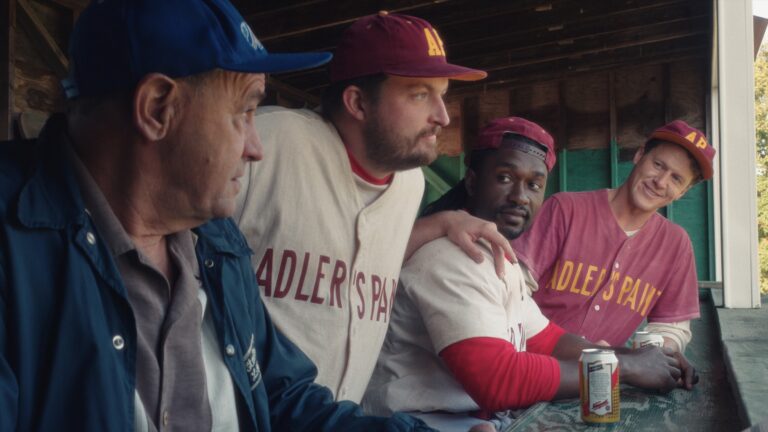Eephus (2024 | USA | 99 minutes | Carson Lund)
In actor/cinematographer/film critic Carson Lund’s directorial debut, it’s Sunday October 16 in mid-1990s1 suburban Massachusetts. It’s a sunny day, but the hint of a chill in the air already has residents minds turning to the long dark winter ahead. Between radio reports — voiced by master documentarian Frederick Wiseman — of a coyote terrorizing the area and the “New Hampshire Justice” that awaits the poor creature, we hear that a beloved park will soon be the site of a new elementary school. Soldier’s Field will be no more, but it’ll sure improve the commute time for young parents.
So, it’s on that crisp autumn afternoon that Eephus finds twenty adult men assembling on a recreational league baseball field for the last time to close out the season’s record book by playing a storm-delayed game. First to arrive is dedicated observer Franny (Cliff Blake), an elderly man who seemingly materializes on foot from a nearby woods with his scorebook and folding table in tow to make the game official. Soon, men in their thirties to sixties comprising the two teams — the River Dogs and Adler’s Paint — who’ll play this historic last game. Wearing mismatched jerseys, from professional-adjacent cosplay to faded T-shirts, both rosters represent the full spectrum of athletic conditioning and ability from stray college students to near-retirees gasping for air and relegated to the outfield.
Playing out in loose chapters, we see that these guys have varying levels of commitment to playing out this meaningless game. As it starts, the home team wouldn’t be at all disappointed if the game ended at the bottom of the first inning if the away squad is forced to forfeit if their ninth player doesn’t show up in time to take the field. Eventually though, the spirit of the game takes hold and a determination to play it out to the final inning spreads through enough of the players to drag the game past the golden hour to twilight.
As the day lumbers on kids, girlfriends, various passersby pay visits to catch some of the game. A 1972 broadcast and music plays on a dugout boombox. A nearby soccer field sees team practices come and go. A guy selling pizza out of a truck sets up nearby, much to the chagrin of the hot dog purists. Some ne’er-do-well skaters start watching from behind the outfield’s fence and find themselves drawn into the unfolding amateur athletics (a kid watching appraises their abilities succinctly: “these guys aren’t much better than my 10-year-old friend’s team”).
True to regional stereotype, the guys are a prickly bunch who communicate in guarded comments, anodyne chatter, and prickly taunts. They’ve probably known each other forever, but what they know about each other is buried deep beneath the surface of their clipped conversations. Instead we get a sense of their ailing bodies and some lingering animosity about the field being razed to make room for a new school, ironically, the project is being developed by the captain of one of the teams. Of course, he prefers to leave work off the field. Despite their varying ages and abilities, the recreational baseball field is cast as what Lund describes as a “ritualistic space for reflection and leisure” and despite the gentle comedy of the film and the cynicism of the aging northeastern men, it’s one that they all take seriously.
As the light fades, the few spectators disperse, and aging bodies get more and more tired. With Adler’s Paint’s starting pitcher (Keith William Richards) determined to pitch a complete game, their backups have been confined to the bench to chat for innings at a time. The much younger pitcher (Nate Fisher, one of the film’s co-writers) has been working on the Eephus pitch that gives the movie its title. Between commenting on the unfolding game, he explains it as follows:
The Eephus pitch is a type of curveball that is pitched so unnaturally slow that it confuses the batter. He swings too early or too late. You lob it so it looks like a curveball, but you give it no power. Your elbow stays in the same place that it would for your curveball. And you tell the batter with your hips that you’re throwing hard. Everybody on the field is expecting a meatball; so I give them a weird meatball. I throw it right and the pitch looks like it stops in midair.
You can tell when it’s an Eephus. Stays in the air forever. You get bored watching it. I get bored. And the hitter does so he tries to swing at it like normal but it’s already past him or it waits until he’s done swinging. The Eephus makes him lose track of time. It’s pretty mean that way.
When he starts this soliloquy, he and his teammate (Conner Marx) are at opposite ends of the bench. By the time it’s done, they’re shoulder to shoulder and their team has fallen another two runs behind. As a metaphor for the game (and for the film, which is also a sun-kissed metaphor for the game, captured in dreamy light from morning to night by cinematographer Greg Tango) … how can you not be romantic?
The game stretches on, players come and go. The scorekeeper becomes the tie breaking umpire. Bill “Spaceman” Lee (master of his own variation of the titular pitch) incongruously appears from the ether of this inverse Field of Dreams to toss an inning. Sure maybe these men would rather force themselves to play baseball almost out of spite, long past sunset, hours after the official refs have called it quits, having run out of spare balls, using the headlights of their cars and trucks to shed some light the field, rather than go to therapy. But maybe what they’re doing is equally effective? Nobody’s mom is calling them home for dinner; it’s only their inflamed joints and gripes that would send them home before closing the book on the field, the season, and maybe ever playing together again. Love of the game is one thing, but driving twenty minutes to play in a league the next town over is a bridge too far.
Maybe they’ll get beers after the game, maybe they’ll catch up at the local bar over the winter. Unlikely, but for one day it’s magic hour forever and they leave it all on the field.
Eephus is currently available on VOD; a DVD release is planned for June; Lead Image courtesy Music Box Films
1. The calendar suggests the only such date in the 1990s fell in 1994, but let’s not hold this dreamlike recollection to specifics




